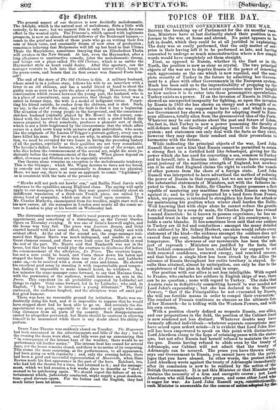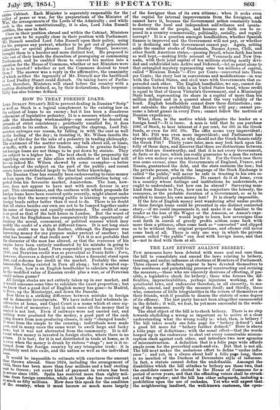TOPICS OF THE DAY.
THE COALITION GOVERNMENT AND THE WAR. BEFORE the breaking up of Parliament for the six months' vaea. tion, Ministers have at last distinctly stated their position in re.• ference to the war, at home and abroad. No point appears to be left in doubt, which they could be at all justified in explaining. The duty was so easily performed, that the only matter of snr. prise is their having left it to be performed so late, and having consented to undergo so much misconstruction where a few simple words would have completely set them straight.
First, as opposed to Russia, whether in the East or in the North, the position is now as clear as crystal. The two principal objects of the war are to deprive Russia of the power of renewing such aggressions as the one which is now repelled, and the com- plete security of Turkey in the future by admitting her Govern- ment to a place with other Governments in the European system. Much has been said as to the impracticability of propping up the decayed Ottoman empire ; but recent experience may have taught us how useless it is to enter into these presumptive speculations. Turkey exists as a power. If on the invasion of Russia in 1829 she showed an unexpected incapacity for fighting, so upon the invasion by Russia in 1853 she has shown an energy and a strength of re- sistance which she was supposed to have lost ; and what is more her Government has shown a capacity for adapting itself to Euro- pean alliances, totally alien from the preconceived idea of the Porte. Whatever may be our notions about the past and future of Islam, the fact is, that Turkey is now a power possessing the faculty of self-defence and the faculty of adapting herself to the European system ; and statesmen can only deal with the facts as they exist, however they may shape their conduct and their precautions to harmonize with the future.
While indicating the principal objects of the war, Lord John Russell threw out a hint that Russia cannot be permitted to retain a strong fleet in a fortified hold like Sebastopol, giving her the power which she has used for converting a sea, common to Turkey and to herself, into a Russian lake. Other states have expressed great jealousy of the maritime strength of England, but nowhere can it be said that England claims the right to exclude the vessels of other powers from the shore of a foreign state. Lord John Russell was interpreted to have advertised the method of reducing the power of Russia in that respect; but we are now dealing with the substantial statements of Ministers, not with the fallacies im- puted to them. In the Baltic, Sir Charles Napier possesses a fleet capable of mastering any maritime force which Russia can bring against it; and he will be supported by a land force from France, which, we presume, is intended to strengthen his force for-attack or for maintaining his position when winter shall harden the Baltic. Well knowing that with ships alone he cannot reduce the granite forts of Russia by a coup de main, Sir Charles Napier has evinced a sound discretion : he is known to possess experience; he has un- bounded trust in- the energy and bravery of his countrymen ; he holds a carte blanche. It has sometimes been said that our soldiers in Turkey are ill fed and comfortless : amongst the many detailed facts adduced by Mr. Sidney Herbert, one alone would refute,every statement of the kind—the sickness amongst the soldiers does not exceed four per cent, including what springs from voluntary in- temperance. The slowness of our movements has been the sub- ject of reproach : Ministers are justified by the facts, that the Turkish commander has been enabled by our support to act with renewed confidence, renewed energy, and renewed success, and that before a single blow has been struck by, the Allies the advance of Russia throughout her entire territory is stayed. Re- sults thus attained, almost by anticipation, can only be due to the completeness of the plan in detail and in scope. Our position with our allies is not less intelligible. With regard to France, who embarks her soldiers in English ships of war, there can be no question • none with regard to Turkey. The risks that Austria runs in definitively committing herself to war needed not Lord John's expounding ; but she has declared to the Western Powers, " that if the Principalities be not evacuated by Russia, she will use forcible means in order to compel their evacuation." The conduct of Prussia continues as obscure as the ultimate fate of her Monarch—he is trifling with the Western Powers, and with his own crown.
With a position clearly defined as respects Russia, our allies, and our preparations in the field, the position of the Cabinet itself is now rendered not less distinct. Whatever doubts may have formerly affected individuals—whatever separate conceptions may have seized upon ardent minds—it is evident that Lord John Rus- sell has been empowered to speak on this point with distinctness. Lord Aberdeen clung to the hope of retaining peace with the status quo, but not after Russia had herself refused to maintain the sta- tus quo. Russia having refused to abide even by the treaty of Adrianople, our Cabinet will not admit that the treaty of Adrianople can be secured. The peace you have thrown away, says our Government to Russia, you cannot have with the privi- leges that you have abused. In other words, the protest which' Lord Aberdeen wrote against the treaty of Adrianople immediately after its conclusion is now to be realized by the action of the British Government. It is not •this Minister or that _Minister who sustains the necessity of a firm and energetic course ; not Lori Aberdeen who still. hankers after peace, and some.other Lord who is -eager for war. As Lord. john Russell says, constitntiouagh, each anawerable=ior-the course of action adoptedly,tite: entire Cabinet. Each Minister is separately responsible for the ley of peace or war, for the preparations of the Minister of ar, the arrangements of the Lords of the Admiralty ; and while inch is- the case constitutionally, it is also, Lord John Russell certifies, the case in fac t. Clear in their position abroad and within the Cabinet, Ministers appear now to be- equally clear in their position with Parliament. 3fr. Disraeli assailed Lord John Russell upon their policy, using for his purpose any pretext, whether to be got out of generalized inductions or special phrases. Lord Dudley Stuart, however, brought them to a harsher and more distinct test. He proposed to take out of their hands the discretion of proroguing or summoning Parliament, and he enabled them to convert his motion into a question for the House of Commons, whether or not Ministers were fit to be trusted ? whether or not the Commons desired to trust them The answer was a reply in the affirmative, the unanimity of which neither the ingenuity of Mr. Disraeli nor the hardihood of Lord Dudley Stuart could disturb. On taking leave of Parlia- ment, therefore, Ministers will stand before the country with a position distinctly defined, as, by their declarations, their responsi- bility has also become defined.



































 Previous page
Previous page